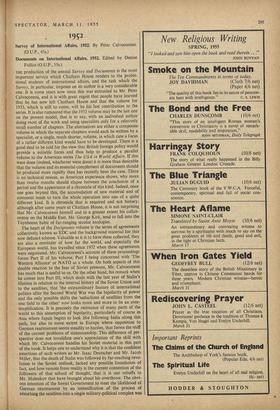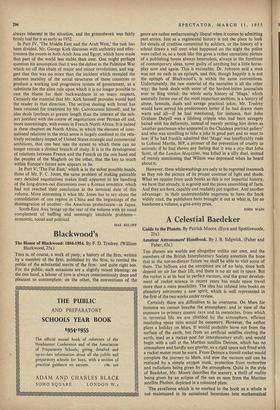1[952 Survey of International Affairs, 1952: By Peter Calvocoressi. (0.U.P.,
45s.)
Documents on International Affairs, 1952. Edited by Denise Folliot (0.U.P., 55s.) THE production of the annual Survey and Documents is the most important service which Chatham House renders to the profes- sional students of international affairs, and the task which the Survey, in particular, imposes on its author is a very considerable one. It is some years now since this was entrusted to Mr. Peter Calvocoressi, and it is with great regret that people have learned that he has now left Chatham House and that the volume for 1953, which is still to come, will be his last contribution to the series. It is also rumoured that the 1953 volume may be the last one on the present model, that is to say, with an individual author doing most of the work and using specialists only for a relatively small number of chapters. The alternatives are either a composite volume in which the separate chapters would each be written by a specialist, or a single, much shorter, volume, in which case a focus of a rather different kind would have to be developed. There is a good deal to be said for the view that British foreign policy would provide a suitable focus and thus help to produce a parallel volume to the American series The USA in World Affairs. If this were done (indeed, whichever were done) it is more than desirable that the volume and its essential complement of documents should be produced more rapidly than has recently been the case. There is no technical reason, as American experience shows, why more than twelve months should elapse between the conclusion of a period and the appearance of a chronicle of this kind. Indeed, once one goes beyond this, the accumulation of new material and of comment tends to turn the whole operation into one of a quite different kind. It is chronicle that is required and not history; although after some years at Chatham House, it is not surprising that Mr. Calvocoressi himself and to a greater extent his collab- orator on the Middle East, Mr. George Kirk, tend to fall into the Toynbeean habit of far-ranging secular analogies.
The heart of the Documents volume is the series of agreements collectively known as EDC and the background material for that now defunct scheme. Valuable as it is to have these collected, they are also a reminder of how far the world, and especially the European world, has travelled since 1952 when these agreements were negotiated. Mr. Calvocoressi's account of these proceedings forms Part 11 of his volume, Part I being concerned with 'The Western Alliance' or NATO as a whole. On both aspects of this double reaction to the fear of Soviet pressure, Mr. Calvocoressi has much that is useful to us. On the other hand, his remark when he comes into Part Ill, which deals with the last year of Stalin's lifetime in relation to the internal history of the Soviet Union and to the satellites, that 'the extraordinary feature of international politics after the Second World War was the bipolarity of power and the only possible shifts the 'seductions of satellites from the one field to the other' now looks more and more to be an over- simplification. It is precisely the resistance of many parts of the world to this assumption of bipolarity, particularly of course in Asia where Japan begins to look like following India along this path, but also to some extent in Europe where opposition to German rearmament seems steadily to harden, that forms the stuff of the current problems of statesmanship. This difference of per- spective does not invalidate one's appreciation of the skill with which Mr. Calvocoressi handles his Soviet material in this part of the book. It helps one to understand why it is that the confident assertions of such writers as Mr. Isaac Deutscher and Mr. Jacob Miller, that the death of Stalin was followed by far-reaching revo-
lution in the Soviet outlook, lacked any possible foundation of fact, and how remote from reality is the current contention of the followers of that school of thought, that it is our rebuffs to Mr. Malenkov that have brought about his overthrow. The obvi- ous intention of the Soviet Government to meet the likelihood of German rearmament by an intensification of the process of absorbing the satellites into a single military-political complex was always inherent in the situation, and the groundwork was fairly firmly laid for it as early as 1952.
In Part IV, 'The Middle East and the Arab West,' the task has been divided. Mr. George Kirk discusses with authority and effec- tiveness the events in both Arab Asia and Egypt, which have made that part of the world less stable than ever. One might perhaps question his assumption that it was the defeat in the Palestine War which set off this chain of major and minor revolutions, and sug- gest that this was no more than the incident which revealed the inherent inability of the social structures of these countries to produce a working and progressive system of government, as a substitute for the alien rule upon which it is no longer possible to cast the blame for their backwardness in so many respects. Certainly the material that Mr. Kirk himself provides would lead the reader in that direction. The section dealing with Israel has been retained for treatment by Mr. Calvocoressi himself; and he also deals (perhaps at greater length than the interest of the sub- ject justifies) with the course of negotiations over Persian oil and, more interestingly, with events in French North Africa. It is indeed in these chapters on North Africa, in which the element of inter- national relations in the strict sense is largely confined to the rela- tively secondary impact of United States strategic and commercial ambitions, that one best sees the extent to which these can no longer remain a distinct branch of study. It is in the development of relations between France and the French on the one hand and the peoples of the Maghrib on the other, that the key to much within Europe's future now appears to lie.
In Part V, The Far East,' which is in the safest possible hands, those of Mr. F. C. Jones, the same problem of making palatable very detailed negotiations makes itself apparent in his handling of the long-drawn-out discussions over a Korean armistice, which had not reached their conclusion at the terminal date of this volume. More interesting is what Mr. Jones has to say about the consolidation of one regime in China and the beginnings of the disintegration of another—the American protectorate—in Japan.
South-East Asia brings up the rear of the volume with its usual complement of baffling and seemingly insoluble problems— economic, social and political.
MAX BELOFF











































 Previous page
Previous page